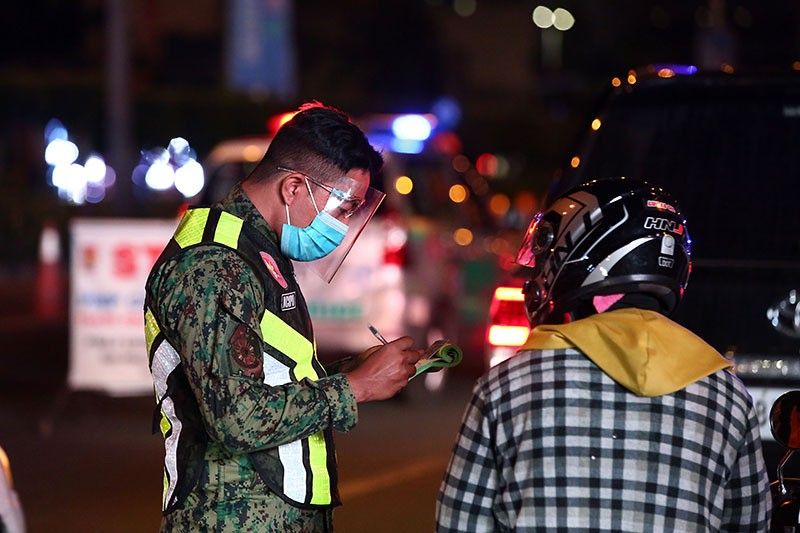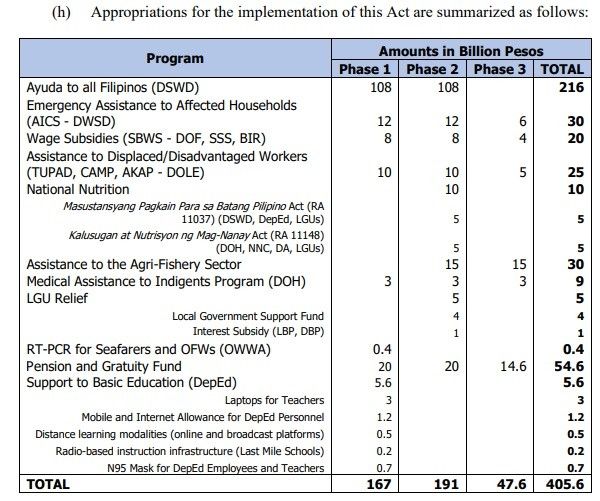P54.6B for military, police pension raises questions on 'Bayanihan 3' priorities

MANILA, Philippines — When lawmakers at the House of Representatives proposed a new pandemic relief package worth P401 billion, one particular spending item stood out: the P54.6-billion allocation for the pension of military and police.
It was the second biggest appropriation in the measure, eclipsing funds allocated for programs like wage subsidies, allowance for teachers and aid for the agri-fishery sector. Authors of the bill — titled Bayanihan To Arise As One Act (Bayanihan 3) — said the amount was meant to restore a deep budget cut in in the pension and gratuity funds for soldiers and cops in the 2020 budget.
It’s a “liability” that must be met, lawmakers said, but observers argued it puts into question whether the cash-strapped government would spend on the right priorities amid the pandemic. “The P54-billion sticks out like a sore thumb,” analysts from the Institute for Leadership, Empowerment, and Democracy (iLEAD), a think tank, said in a Zoom interview.
“All of a sudden you have a P54-billion pension gratuity fund which not everyone will benefit from. Not all seniors will benefit,” they added. “The issue is the ballooning fiscal deficit.”
There is basis for this. To blunt the pain from renewed lockdowns, economic officials led by Finance Secretary Carlos Dominguez III expects government spending to inch up 1.72% to P4.74 trillion this year from the original program of P4.6 trillion. That would push up the budget deficit as a share of the economy to 9.4% in 2021 from their original projection of 8.9%.
Despite the bigger disbursements from a new fiscal stimulus, the economy is still bound to underperform. For this year, economic managers see gross domestic product growing 6-7% this year, slower than their previous forecast of 6.5-7.5%.
This, in turn, increases the urgency for the government to spend its dwindling resources on the right programs so the country can quickly exit the pandemic, Ruben Carlo Asuncion, chief economist at UnionBank of the Philippines, said.
“I personally think that COVID-related fiscal allocations should be priority. Budget restoration of certain items on the previous budget should take less priority, at this point,” Asuncion explained in a text message. “A more encompassing fiscal response should be the goal so that help can be given to as many Filipinos as possible,” he added.

A compromise?
Marikina Rep. Stella Quimbo, one of the authors of Bayanihan 3, earlier told CNN Philippines that the funds for military and police pension were not in any of the original six bills that were later consolidated into one substitute bill, which is now awaiting third and final reading at the House of Representatives. “This was a request of the DBM (Department of Budget and Management),” Quimbo said.
As it is, the arrears on pension and gratuity fund wouldn’t have grown to its current size had it not been for President Rodrigo Duterte’s three-year-old policy mandating base pay increases for the military and police, which increased the pension given to retired personnel. If the current system prevails, the government will be required to allocate around P850 billion to military and police pensions annually for the next 20 years.
For analysts at iLEAD, the insertion of pension fund in Bayanihan 3 could be a way for lawmakers to win concessions with economic managers. This is because unlike the previous “Bayanihan” laws, economic officials seem cool to the new one, with Dominguez himself making clear that any new spending should have a counterpart revenue to avoid incurring more debts. “So it looks like that’s the compromise,” they said.
But the fact remains that soldiers and police, who have also been on the frontlines of the country’s pandemic response, deserve to receive what the government owes them. “It’s rather frustrating because the military deserves pension… Other development priorities need to compete with that,” analysts at iLEAD said.
Albay Rep. Joey Salceda, another author of Bayanihan 3, agreed. “This is a liability, so we are really obliged to budget for it,” Salceda said when sought for comment. “If we didn't put it in, we would have continued withholding something that the retired uniformed personnel have already earned.”
For Nicholas Mapa, senior economist at ING Bank in Manila, the pension fund could still help Bayanihan 3 fulfill its objective of recharging the consumption-reliant economy since it would help increase the purchasing power of families of uniformed personnel . “The economy remains mired in a deep recession with the mainstay sector, household spending stuck in low gear. At this juncture, additional spending to bolster the economy is of utmost importance but as you noted not all spending is created equal,” Mapa said in an e-mail.
“Expenditures that can easily find their way to household spending will be the most effective in jump starting the economy and even this measure may help ignite some consumption efforts as the money is funneled to uniformed personnel who in turn may use the pension funds for day to day expenditures,” Mapa added.
- Latest
- Trending


























